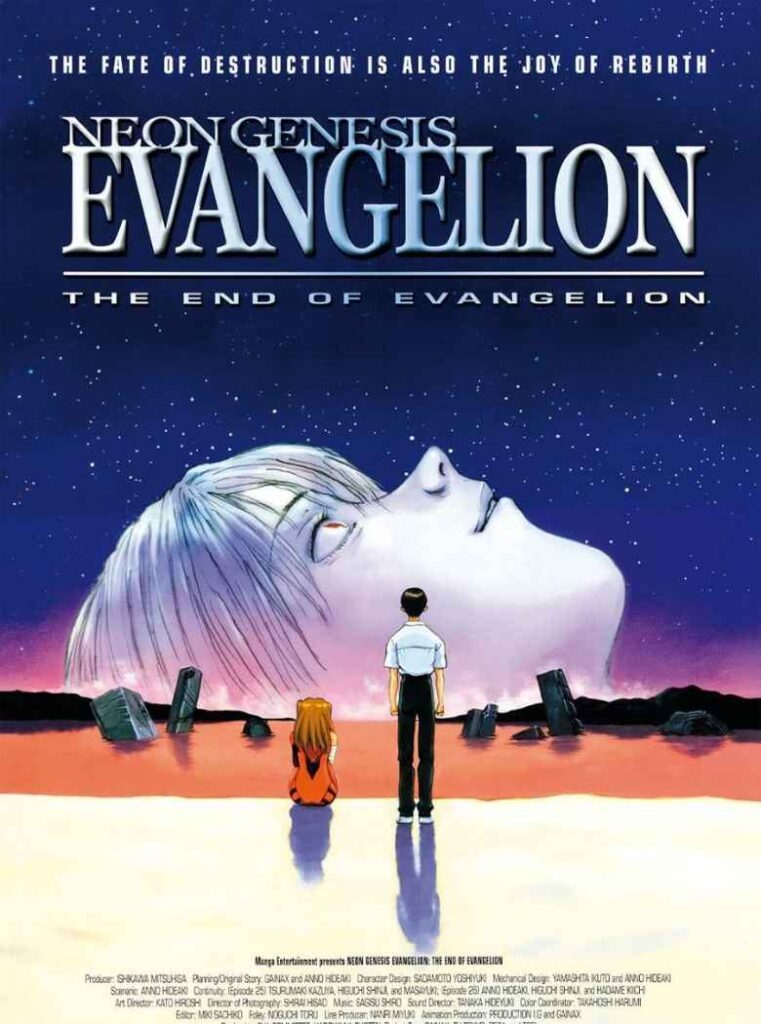The End of Evangelion is a stunning and deeply unsettling conclusion to Neon Genesis Evangelion, a series that redefined the mecha and psychological anime genres. Released in 1997, this film serves as an alternative ending to the original series, offering a more visually intense, philosophical, and emotionally devastating finale.
With breathtaking animation, abstract storytelling, and a harrowing look into the depths of the human mind, The End of Evangelion is not just an anime movie—it is an experience that challenges the very idea of existence, identity, and human connection.

Movie Details
| Title | The End of Evangelion (Shin Seiki Evangelion Gekijouban: The End of Evangelion) |
|---|---|
| Director | Hideaki Anno, Kazuya Tsurumaki |
| Studio | Gainax, Production I.G |
| Release Date | July 19, 1997 (Japan) |
| Runtime | 87 minutes |
| Genre | Mecha, Psychological, Drama, Sci-Fi |
| Language | Japanese (with multiple dubbed versions) |
| IMDb Rating | 8.0/10 |
| Number of Reviews | Over 70,000 user reviews |
| IMDb Link | IMDb Page |
The Beginning of the End
The film begins where Episode 24 of the anime left off—Shinji Ikari, the pilot of Evangelion Unit-01, is emotionally broken after being forced to kill his only friend, Kaworu Nagisa. He has lost all sense of purpose, and his relationships with those around him—Misato, Asuka, Rei, and Gendo—are in ruins.
Meanwhile, the secret organization SEELE begins their final plan, initiating an all-out assault on NERV headquarters. They want to take control of the Evangelions and trigger the Human Instrumentality Project—a process that will merge all human souls into one being, eliminating individuality and suffering.
As chaos unfolds, every character faces their darkest fears, leading to a climax unlike anything ever seen in anime.
The Fall of NERV and Asuka’s Last Stand
SEELE sends its elite JSSDF military forces to attack NERV, ruthlessly killing staff members. Misato desperately tries to protect Shinji, but he is too lost in his depression to fight back.
Meanwhile, Asuka Langley Soryu, previously comatose, suddenly awakens. She discovers that her mother’s soul resides inside her Evangelion, and for the first time, she feels loved and powerful.
Launching in Unit-02, she single-handedly takes down multiple enemy forces, finally regaining her confidence. However, SEELE releases the terrifying Mass Production Evangelions, nine white, grotesque units with unsettling, human-like smiles.
Despite her fierce determination, Asuka is overwhelmed and brutally defeated. In one of the most shocking scenes in anime history, the Mass Production Evangelions tear her Evangelion apart, leaving her mortally wounded.
Shinji’s Breakdown and Rei’s Transformation
Misato, in her final moments, rescues Shinji and urges him to pilot Unit-01. She kisses him goodbye before dying from gunshot wounds, leaving Shinji completely alone and broken.
When he finally reaches Unit-01, something mysterious happens—the Evangelion moves on its own and rises into the air, as if responding to a greater force.
Meanwhile, Gendo Ikari attempts to merge with Rei Ayanami to begin Instrumentality, but Rei rejects him. Instead, she merges with Lilith, the giant white being deep within NERV. In a stunning, surreal transformation, Rei’s body expands into a god-like figure, becoming an entity beyond human understanding.
This marks the beginning of the end of the world.
The Human Instrumentality Project
As Rei-Lilith expands across the Earth, she begins absorbing human souls, turning them into pure energy. The Mass Production Evangelions form a giant red cross in the sky, signaling the completion of Instrumentality.
Shinji, now inside Unit-01, is left with the ultimate choice—should humanity remain separate individuals, with all their pain and suffering, or should everyone merge into a single consciousness, free from loneliness and fear?
In an abstract, deeply emotional sequence, Shinji experiences his own memories, regrets, and traumas, confronting the people in his life—Asuka, Misato, Rei, and his mother, Yui. He struggles with his own self-hatred and fear of rejection, realizing that even in a perfect world without pain, there is no true happiness.
Finally, Shinji rejects Instrumentality. He chooses individuality, allowing humans to exist as separate beings once more.
The Haunting Ending – “Congratulations” or “Goodbye”?
As Instrumentality collapses, Shinji awakens on a vast, empty beach, where the Earth is now a desolate, ruined wasteland.
Beside him lies Asuka, the only other person who has returned to physical form. However, she is emotionless, gazing at the sky with a blank expression.
Shinji, overwhelmed by despair, reaches out and strangles her, possibly to see if she is real. Instead of resisting, Asuka gently touches his face and whispers:
“Kimochi warui.” (“I feel sick.”)
The screen fades to black, leaving viewers with one of the most debated and unsettling endings in anime history.
What This Movie Teaches Us
The End of Evangelion is more than just a conclusion to an anime—it is a philosophical and psychological masterpiece that explores:
- The pain of human existence – Suffering, loneliness, and trauma are unavoidable parts of life.
- The fear of connection – People crave love but are afraid of rejection.
- The value of individuality – Even with pain, life has meaning when we can choose our own path.
Shinji’s choice to reject Instrumentality is a reminder that life is painful, but also beautiful.
Why You Should Watch It
- Stunning Animation & Surreal Imagery – Some of the most powerful and disturbing visuals in anime history.
- Intense Action – Asuka’s battle and the destruction of NERV are unforgettable.
- Deep Psychological Themes – A rare film that challenges viewers to think about the meaning of life.
- A Conclusion to Evangelion – Love it or hate it, this film delivers an ending unlike anything else.
If you have seen Neon Genesis Evangelion, The End of Evangelion is a must-watch, offering a darker, more intense conclusion to one of the most complex anime series ever made.
FAQ – The End of Evangelion
1. What is Instrumentality?
Instrumentality is the process of merging all human souls into one, removing individuality, loneliness, and suffering.
2. Why does Asuka say “I feel sick” at the end?
Her words are open to interpretation. Some believe it reflects her disgust at being alive again, while others see it as her rejecting Shinji’s need for comfort.
3. Why does Shinji strangle Asuka?
It may symbolize his anger, confusion, or need for human connection. Some believe he is testing if she is real.
4. What happened to the other characters?
Since Shinji rejected Instrumentality, other people may return if they choose to. However, their fate is left unknown.
5. What is the main message of the film?
Despite its dark, disturbing themes, the film ultimately teaches that:
- Life is painful, but worth living.
- People must find their own meaning in life.
- Connection and individuality are important, even if they bring suffering.








Add comment